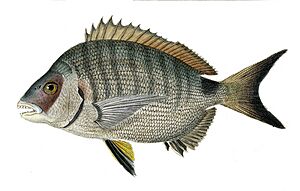St. Helena white seabream facts for kids
Quick facts for kids St. Helena white seabream |
|
|---|---|
 |
|
| St. Helena white seabream (Diplodus helenae) |
|
| Conservation status | |
| Scientific classification | |
| Synonyms | |
|
The St. Helena white seabream (Diplodus helenae) is a type of fish that lives in the ocean. It belongs to a group of fish called seabreams and porgies. This special fish is only found around the island of Saint Helena. Saint Helena is a small island in the southern Atlantic Ocean.
Contents
About the St. Helena White Seabream
How the Fish Got Its Name
The St. Helena white seabream was first officially described in 1879. A French scientist named Henri Émile Sauvage gave it the name Sarus helenae. He named it after Saint Helena Island, where it was first discovered.
For a while, scientists thought this fish was just a type of sargo fish. But now, they agree it is its own unique species. It is part of a group of fish called Diplodus. This group belongs to the larger family of fish known as Sparidae, which includes all seabreams.
What Does It Look Like?
The St. Helena white seabream has a special set of teeth. In its upper jaw, it has 8 teeth that look like human incisors (front teeth). Behind these, it has several rows of small, flat teeth that are good for grinding food.
This fish has a dorsal fin (the fin on its back) supported by 11 or 12 strong spines. It also has between 57 and 71 scales along its lateral line. The lateral line is a special sensing organ that runs along the side of the fish's body. You can often see a dark, saddle-shaped mark near its tail.
The St. Helena white seabream can grow up to 31 centimeters (about 12 inches) long. However, most of these fish are usually around 20 centimeters (about 8 inches) long.
Where Does It Live?
This fish is found only in the waters around Saint Helena. It lives in the southern central Atlantic Ocean. You can usually find it in water that is between 5 and 15 meters (about 16 to 49 feet) deep. It likes areas where rocks and sand mix together on the ocean floor.


